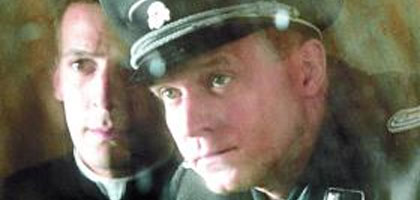
Amen.
France/Germany 2002

Reviewed by Geoffrey Macnab
Synopsis
Our synopses give away the plot in full, including surprise twists.
World War II. SS officer Kurt Gerstein (Ulrich Tukor), a chemist who has been providing the German army with Zyclon B gas, discovers the gas is being used to kill Jews on the East European front. A committed Christian, he visits a senior Catholic priest who cold-shoulders him. Riccardo (Mathieu Kassovitz), a young Jesuit, overhears his claims and gets in contact to find out more.
Riccardo heads back to Rome where he hopes to alert the Pope. But the Catholic Church, Riccardo learns, approves of the Nazi stand against Communist Russia. Gerstein, meanwhile, is trying to lessen the killing by claiming that consignments of the gas are flawed.
Riccardo arranges for Gerstein to go to Rome in the hope he'll sway the Pope. As he arrives, the Nazis are rounding up Italian Jews. Riccardo implores the Pope to intervene; infuriated by the Pope's inaction, he joins the Jews at the station and is deported to a Nazi death camp.
Gerstein intervenes to save him by forging a letter from Himmler. He is caught out by his colleague, the doctor who's in charge at the camp. Riccardo is killed. By now, the Nazis are facing defeat. The doctor allows Gerstein to avoid arrest and travel back to Germany where he visits his family, who can't accept the war has turned against them. He falls into French hands, and tells his captors all he can about the logistics behind the Holocaust. He is found hanged in his cell. The doctor, meanwhile, receives protection from the Catholic dignitaries who'd ignored Gerstein and Riccardo.
Review
It's rare that a film is overshadowed by its poster, but that's exactly what happened to Costa-Gavras' Amen. The poster, designed by Oliviero Toscani (Benetton's erstwhile art director), shows a blood-red crucifix/swastika with the faces of a Nazi soldier and a Jesuit priest on either side of it. Many Christian groups were appalled but the image seems apt enough. It sums up the key themes of the film - the Catholic Church's shameful failure to speak out against the Holocaust and the martyrdom of the individuals like the (real-life) SS officer Kurt Gerstein and the (fictional) young priest Riccardo Fontana who had the courage to fight against it.
If its aim is to remind us of the moral cowardice and obtuseness of individuals and institutions in the face of the Nazi horrors, Amen. works well enough. It draws attention to the wartime failures of the Vatican and highlights the heroism of loners like Gerstein and Riccardo. However, as a piece of storytelling, the film is clumsy and predictable. There is little of the dynamism that characterised Costa-Gavras' Z, with its wit, riveting documentary-style cinematography by Raoul Coutard and livewire performances; instead, we're offered a handsomely shot but stolid drama.
In its evocation of Hitler-era Germany and Italy, Amen. shows a world familiar from countless other films, with psychopathic Nazis speaking English in heavy German accents who describe mass-murder in pseudo-scientific terms. The opening, in which we see Stephan Lux, a German-Jewish journalist, committing suicide in front of delegates at the League of Nations in 1936 in a desperate bid to alert the world to the persecution of the Jews, makes a point which the film repeats again and again. For whatever reasons, pastors, politicians, diplomats and soldiers chose to ignore evidence of the Holocaust.
The film-makers largely avoid imagery of the death camps, hinting instead at the atrocities in a more oblique way. Thus we're treated to endless, heavily symbolic shots of trains hurtling across the landscape. When they are empty with their doors open, we know their human cargo has now been disposed of; when the doors are shut, it's because more refugees are on their way to almost-certain death. The attempts at satire are heavy-handed. When Riccardo visits Rome, we see pampered, sybaritic priests and diplomats at the lunch table, grotesquely savouring their food as they defend their inaction with self-serving arguments (for instance, that trying to stop the massacres would hold back the Allied war effort.)
Arguably, the most disappointing aspect of Amen. is the portrayal of Gerstein himself. He was clearly a deeply contradictory character: a committed SS soldier as well as a devoted Christian. Rather than address this ambiguity, the film-makers present him as a one-dimensional hero, implying that he stayed in a senior army job to get closer to the evil he's fighting against. (Matthieu Kassovitz's Riccardo is similarly idealised, a doe-eyed young cleric in a plain black cassock with the same earnest intensity as the protagonist of Robert Bresson's Diary of a Country Priest.) Gerstein's relationships with his father and wife - who don't comprehend or share his beliefs - are never examined in any detail, nor is much made of the irony that he was responsible for supplying the camps with Zyclon B gas.
Just occasionally, we're given hints that Gerstein (excellently played by Ulrich Tukur) is a tortured and complex figure. In one effective scene, an old friend from church days cowers after learning he's in the SS. Another mentions his desperate desire always to make himself popular, even with the fellow Nazis he ostensibly despises. "Your God will have a really hard time with you," the evil doctor tells him, but given that he's portrayed in such a heroic light, it's hard to see why.
Credits
- Director
- Costa-Gavras
- Producer
- Claude Berri
- Screenplay
- Costa-Gavras
- Jean-Claude Grumberg
- Based on the play Der Stellvertreter by
- Rolf Hochhuth
- Director of Photography
- Patrick Blossier
- Editor
- Yannick Kergoat
- Production Designer
-
- Ari Hantke
- Music
-
- Armand Amar
